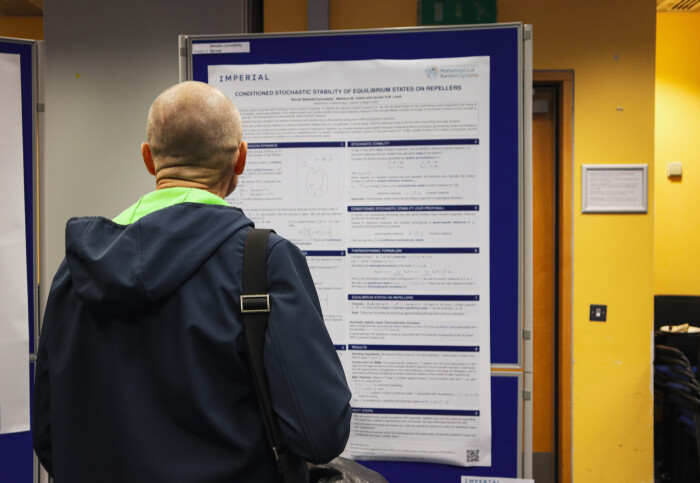Pandemic preparedness cannot rely on vaccine development alone

An attendee looking at the showcase research board
Vaccine experts drew attention to disruption factors around vaccine development and key action plans for future pandemic preparedness planning.
Imperial College London hosted the Natural Sciences Research Showcase on 26 September that spotlighted cutting-edge research by the Faculty of Natural Science’s early-career scientists. Bringing the event to a close was a panel discussion on vaccine development and deployment hosted by four experts across the Faculty of Medicine, Department of Chemistry and Business School.
In the wake of the COVID-19 pandemic, experts and scientists have propelled vaccine research.
The panel featured four experts in the field of vaccine development and deployment: Dr Nazila Kamaly (Department of Chemistry), Professor Marisa Miraldo (Centre for Health Economics & Policy Innovation), Dr Katy Gaythorpe (School of Public Health) and Dr Stephanie Ascough (Department of infectious Disease), chaired by Professor Erhard Hohenester (Department of Life Sciences).
The researchers shared a few key scientific, economic and social challenges behind pandemic preparedness and lessons learned from the COVID-19 epidemic.
Global collaboration is key

Dr Kamaly started the discussion by focusing on the importance of collaboration between scientific disciplines. She said: “To meet the challenges of pandemics, we need greater collaboration on a global level between chemists, biologists, engineers and immunologists.”
A prime example of this is a current project led by Imperial, which will be co-funded by US $57m (£44m) from the European Union’s Horizon Europe Programme and CEPI (the Coalition for Epidemic Preparedness Innovations). Dr Ascot outlined these institutions. She added: “These institutional bodies prepare by working across cross cultural and global boundaries. We can’t keep reacting, it’s how we prepare.”
Factors, from research and development to educational and training bodies are key to pandemic preparedness, instead of relying on vaccine development alone.
Vaccine coverage varies, and recently there has been a drop in the coverage of COVID vaccines. Experts pointed out that different vaccines may offer better efficacy or lower side effects in some demographics than others. The COVID epidemic revealed global inequalities in vaccine access and equity, with some countries being unable to rollout a range of vaccines.
Professor Miraldo pointed out that, “There is a divide between high- and low-income countries and there is no international jurisdiction to ensure low-income countries can access vaccine variety.”
In offering different vaccine options for the same virus, it would close financial gaps in global healthcare.
Pre-empt pandemic disruption
Pandemic disruption factors included vaccine hesitancy and misinformation. Both greatly affect coverage of vaccine rollouts. Dr Gaythorpe said:
“Challenges involve building trust between healthcare providers and local communities. Dr Katy Gaythorpe School of Public Health
"Many members of the public questioned how quickly the COVID-19 vaccines were deployed which created a lot of controversy.”
“It takes years to develop a vaccine that blocks transmission. Vaccine development often starts off as an immunology vaccine which boosts the person’s immunity. It’s likely they will still get the virus, but it won't be as severe. Best case scenario, that they won’t need hospitalising.”
Decades of research underpinning mRNA vaccines was carried out before the pandemic hit but had never been developed blocking transmission phases.
She and other panelists emphasised that researchers needed to be better at communicating the differences in immunity-boosting versus transmission-blocking vaccines to better build public understanding. Dr Ascough said: “We’ve been bad at communicating this to the public. They get confused because they still got the virus despite having the vaccine – and bad communication is how misinformation gets spread.”
The panel iterated that vaccination is so complex because of disruption that spans across not only scientific barriers, but social and economic ones too. They concluded that preparedness and collaboration are central to future pandemic planning.
This involves increasing capital for lower-income countries and channeling efforts towards education, ensuring that they have the means to collaborate fully with experts across the globe.
Article text (excluding photos or graphics) © Imperial College London.
Photos and graphics subject to third party copyright used with permission or © Imperial College London.
Reporter
Press Office
Communications and Public Affairs
- Email: press.office@imperial.ac.uk
